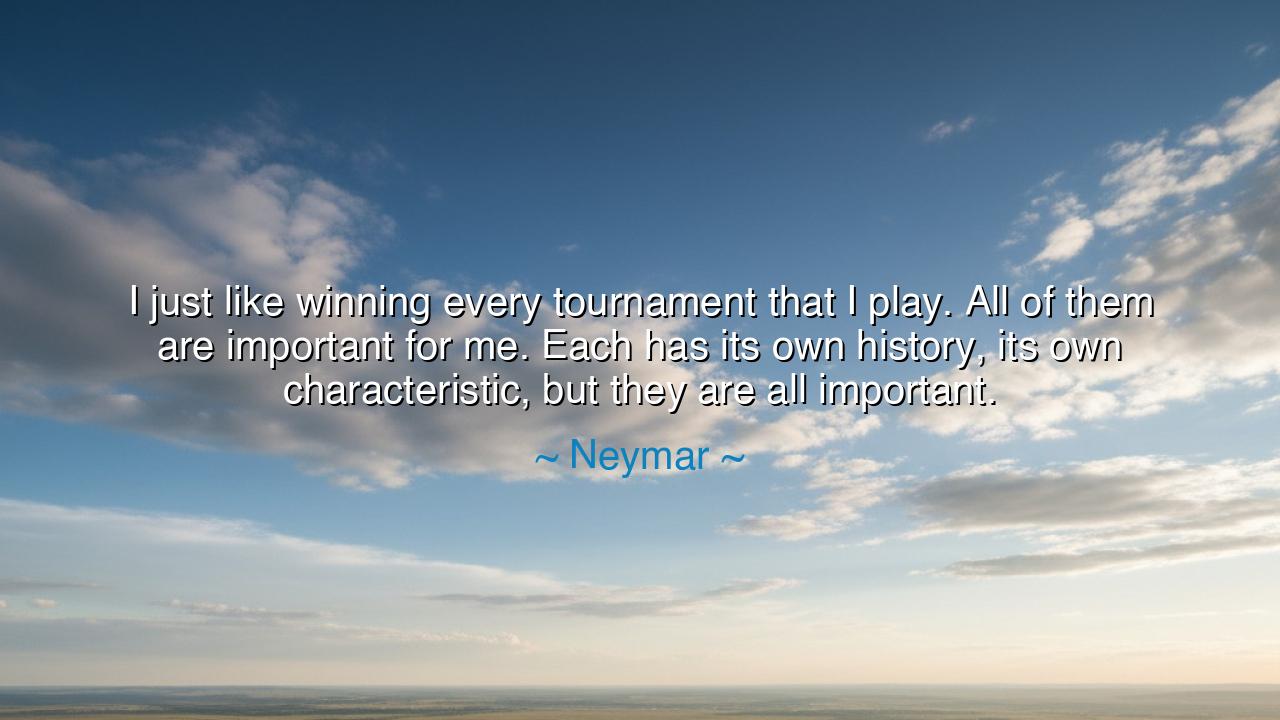
I just like winning every tournament that I play. All of them are
I just like winning every tournament that I play. All of them are important for me. Each has its own history, its own characteristic, but they are all important.






“I just like winning every tournament that I play. All of them are important for me. Each has its own history, its own characteristic, but they are all important.” Thus spoke Neymar, the Brazilian prodigy whose feet dance with the fire of ambition and the grace of artistry. To some, his words may seem simple—a champion’s hunger for victory—but within them lies a wisdom deeper than sport. It is the creed of one who honors not only triumph, but the sacred struggle of every contest. For Neymar speaks here not merely of winning games, but of the spirit of excellence, the eternal drive to give one’s best in every arena, whether grand or humble. His is the philosophy of total devotion—the belief that every challenge deserves reverence, for each moment of effort is a thread in the grand tapestry of destiny.
In saying that “each tournament has its own history and characteristic,” Neymar recognizes a truth that many forget: that no victory is the same, and no struggle should be dismissed. Every contest carries its own story—its own soil, its own rhythm, its own lesson. To treat each with equal respect is to walk the path of humility within greatness. The wise understand that one must approach every battle—whether mighty or small—with the same discipline, focus, and respect for the craft. For when we choose which moments to honor and which to neglect, we weaken the spirit that sustains achievement. True mastery lies not in selective excellence, but in the constancy of devotion.
This is the mark of the ancient heroes, whose victories were measured not by size, but by sincerity. Consider the tale of Alexander the Great, who, even after conquering Persia, still sought to master himself as much as the world. Each campaign, whether against great kings or nameless tribes, he faced with full resolve, understanding that the measure of a warrior is not the magnitude of his foes, but the purity of his purpose. Like Neymar on the field, Alexander approached every encounter as a proving ground—not for his ego, but for his spirit. It is the same fire that burns in the heart of every craftsman, artist, or athlete who knows that greatness is not occasional—it is continual.
Yet Neymar’s words also reveal something deeper about the nature of passion. To “like winning every tournament” is not merely to seek glory, but to honor the act of striving itself. The true competitor does not chase trophies as symbols of worth; he cherishes the process—the preparation, the pressure, the performance. He finds meaning in the test. The tournament, in this light, is not just an event; it is a mirror in which the soul is revealed. Each match becomes a lesson in patience, teamwork, endurance, and grace. In treating every one as important, Neymar reminds us that life itself is a series of tournaments, and each demands our full heart.
It is a dangerous illusion to believe that some moments matter more than others. The farmer who neglects one field will reap hunger, just as the student who studies only for great exams will stumble in daily life. The athlete who saves his strength only for finals will lose his rhythm in the qualifying rounds. Greatness, then, is not built on peaks of passion but on daily devotion—the quiet, unseen consistency that gives strength to the visible triumphs. Neymar’s creed teaches that every step along the path, every match, every effort, deserves the fullness of one’s spirit.
We also find in his words a quiet reverence for history—for the lineage of struggle that gives meaning to competition. Every tournament, every pursuit, carries the echo of those who came before. To honor that history is to understand that we are not lone performers upon an empty stage, but heirs to a living tradition. The wise athlete, the true artist, does not play only for himself, but for those who paved the way. Neymar’s recognition that each event “has its own history” is a nod to the sacred continuity of human endeavor—the chain of passion that links past and present.
And so, dear listener, take from Neymar’s words a lesson that reaches beyond sport: respect every challenge. Whether you stand before a small task or a grand opportunity, give both the same intensity of purpose. Do not rank your efforts by their size, but by your integrity within them. The soul that gives half its strength to lesser battles will find itself unprepared for greater ones. Approach every endeavor with love, with focus, and with respect for the story it holds. For in the end, victory is not in the prize, but in the honor of participation, the devotion that transforms effort into art.
Thus, the wisdom of Neymar is the wisdom of all who strive for mastery: that every tournament is sacred, every day an arena, every effort an act of reverence. The true victor is not the one who wins once, but the one who gives his all again and again, in every place, under every light. Live as he plays—with passion undivided, effort unwearying, and respect for all that you encounter. For only those who treat every moment as worthy of their best will one day find that life itself has become their greatest and most beautiful victory.






AAdministratorAdministrator
Welcome, honored guests. Please leave a comment, we will respond soon